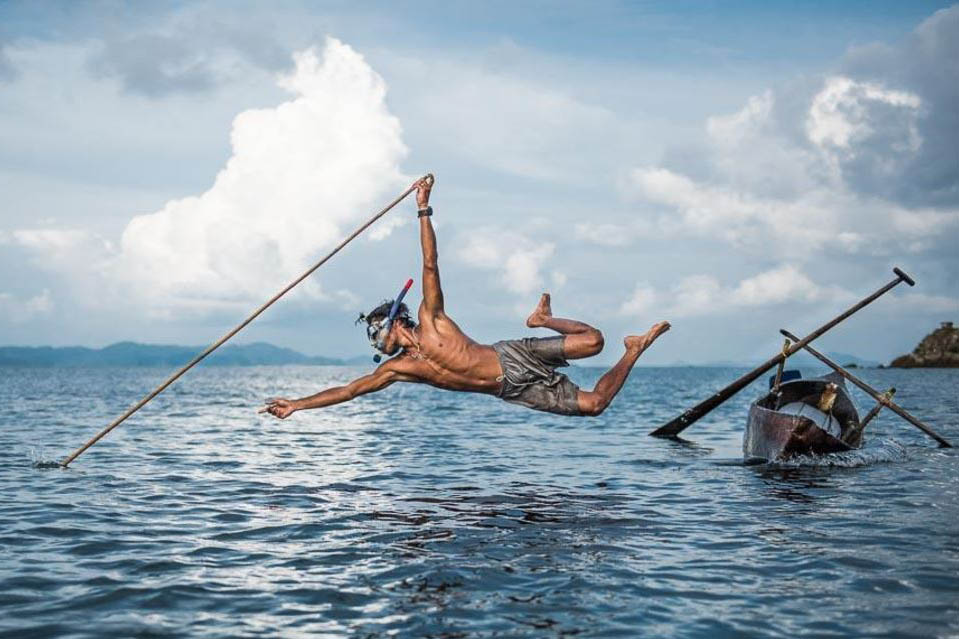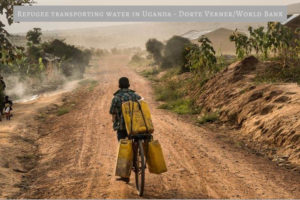
Moken Fisherman most popular photo entry for the Nikon Photo Contest 2016-2017 Photo Credit: Dorte Verner
On a cool Monday afternoon, the MC building gives the impression that staff are either on leave or shaking off Monday blues. Not so for Dorte. I walk into her office and she’s in the middle of compiling a report while connected with staff in different time zones. I promise to keep the interview brief.
Dorte Verner is Lead Agricultural Economist with the World Bank in the Food and Agriculture Global Practice (GFA). She is also a brilliant photographer and a member of the IMF/World Bank International Photographic Society Club (IPS). Most recently Dorte’s photo of a Moken fisher man won the most popular photo entry for the Nikon Photo Contest 2016-2017. The photograph was selected out of 76,000 submitted images. Nikon invited her to Japan to the 100th Year Anniversary for the award ceremony. What is the secret to her exceptional photos? Here’s what she had to say.
Qn: Can you share a little bit of your history. How did you get into photography?
Dorte: My history is short. I photographed like most people until 8 years ago. I traveled to Syria before the war and was amazed by the place and the people and the beauty that I just begun to photograph. Going to new places and seeing new things is what got me started. I joined the International Photographic Society club (IPS) 5 years ago and that was a game changer.
Like everything I’m passionate about, both at work and hobbies, I get into the science and the technicalities. I read and I study and that helps me understand the subject matter. This is also the case for photography.
Qn: You travel a lot for work. How do you balance work and your passion for photography?
Dorte: I hardly take pictures when I travel for work, I can’t do both. The photos I take are more like memories – snapshots. Most of my pictures, especially the ones I’m winning with are taken during holidays or time off. This for example is the case for the six photos exhibited at the IPS exhibit in June. And I tell you, I’m serious with my holidays. Many times I go alone because it’s very hard to be social and focused at the same time. My husband comes with me sometimes, like when I was in Omo Valley in South East Ethiopia on the border with Sudan. It was remote and isolated and we were camping as there are no hotels near the interesting places. This summer he came with me to Japan, and to the North where the Ainu people live.
Qn: What camera do you use?
Dorte: I use the Nikon D810 and my infrared. I started with the Nikon D90 then I bought some better lenses. People spend a lot of money on cameras and not enough on lenses. It’s the eye but the lens helps. Having the best equipment in the world doesn’t make you the best photographer, just like having a fantastic computer doesn’t make you a Nobel prize author.
Qn: Who has influenced your photography?
Dorte: I’m influenced by people. People who have no voice. People who are severely impacted by globalization, climate change, and the tribes that are disappearing. This is my life. It is not only my photography. This is what I do. It’s all about people and vulnerability and how we need to step up because we are all losing. My favorite example is with the Indians in the Amazon, these indigenous people are knowledgeable about the healing plants, we need to learn from them.
I like Sebastian Salgado but I don’t shoot the way he does. I don’t shoot black and white but we care about some of the same things. I agree with him on the principles of photography. When asked at the opening of his exhibition in Brasilia what young photographers should do to get to the next level he said “Go and study. Study economics, anthropology or sociology so you understand what you are photographing.” I could not agree more.
Qn: How do you approach your subjects?
Dorte: I talk to them every time. I learn the languages. I learned Arabic to speak with the Syrians, I speak Portuguese, French, Italian and Spanish. Many times, that language is smile or a gesture.
Qn: Have you been rejected before?
Dorte: Yes, of course. All the time. And that’s fine. I don’t ask outright. It’s very easy for me because I love people. Having a camera gives me an excuse to approach and talk to the old, the young and the kids alike.
Qn: How did you curate the decisive moment for the picture of this Moken fisherman. I understand that the photo is now touring the world?
Dorte: First, I went to Mergui Archipelago in Myanmar because I knew that there were only 1,000 morken people left on the planet. It’s one of the indigenous tribes that are slowly disappearing. They are the only group of nomadic fishermen on the planet. We have nomadic pastoralists, and nomadic farmers but they are the only nomadic fishermen. I studied their history. Did you know they are the only people who can dilate their pupils to see clearly under water?
We rented a boat and went out. At first I photographed the children playing, I got into the water for a different vantage point. Then this guy came out to fish. I took out my other camera, sat in the boat and just started to shoot away. I moved the boat once because of the light, I didn’t take many pictures and I got this result, but I did not know before I was home and downloaded the pictures.

Ugandan refugee transports water
Qn: Your photo display for world refugee day was stunning. Can you talk a little about your experience documenting the African refugees?
I went to Kenya, Niger and Uganda. I love Uganda. I’m so impressed by the people and everything the Government is doing for the refugees. It’s not only just now with the Sudanese refugee crisis but for the past 20 or more years. The people are welcoming. We are putting together a photo book of the refugees I photographed in Nakivale, Takuma and Diffa, which will be shared with all the presidents of Africa by the Vice President of Africa for the World Bank. It is a good way to show the impact of work being done to integrate and settle refugees.
Qn: Any last words of advice to aspiring photographers out there?
Dorte: Just keep on photographing. The more you shoot the better you get.
Well Dorte, thank you! It has been a pleasure talking with you. I have learned a lot as I am sure the readers will too.